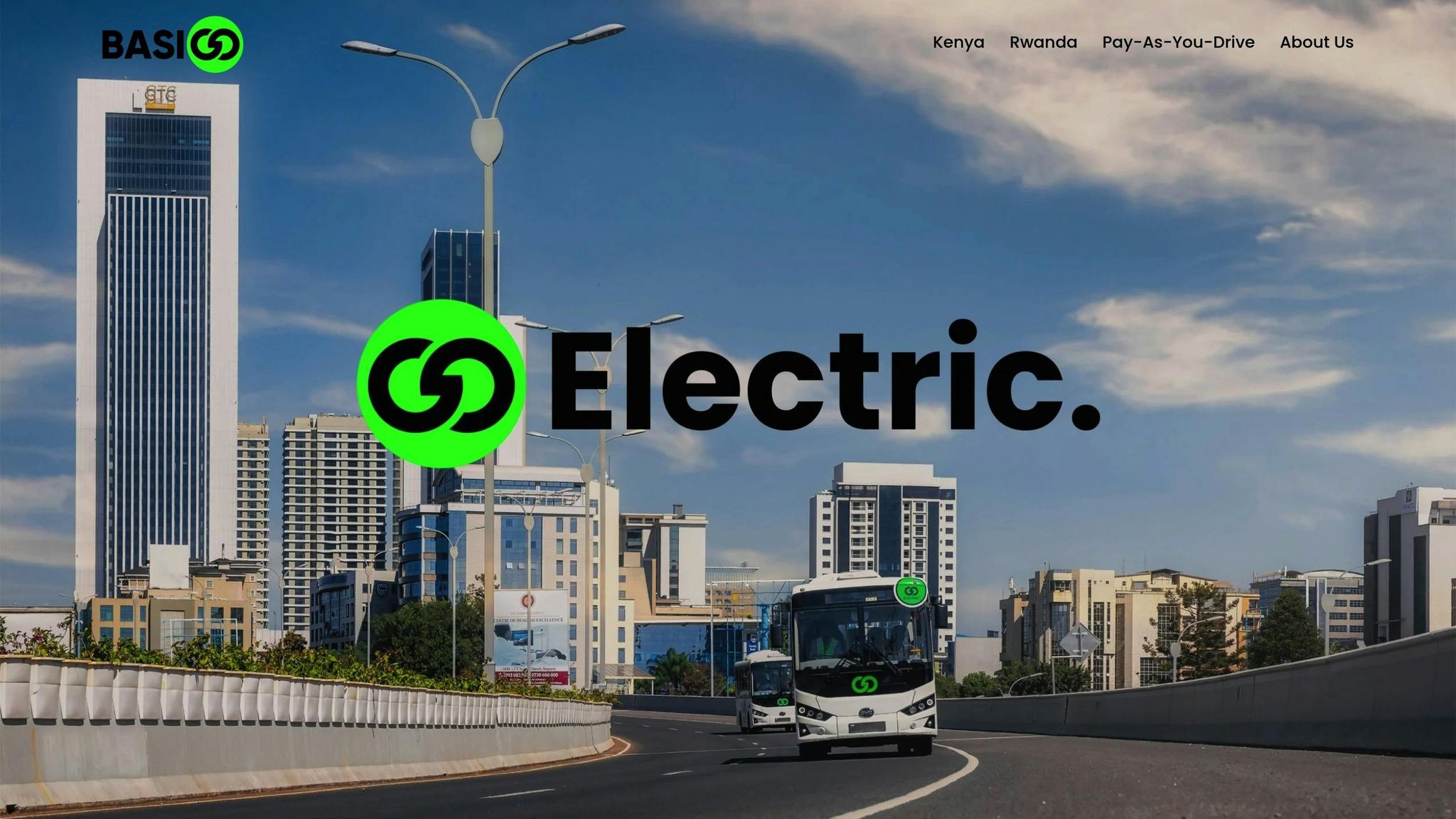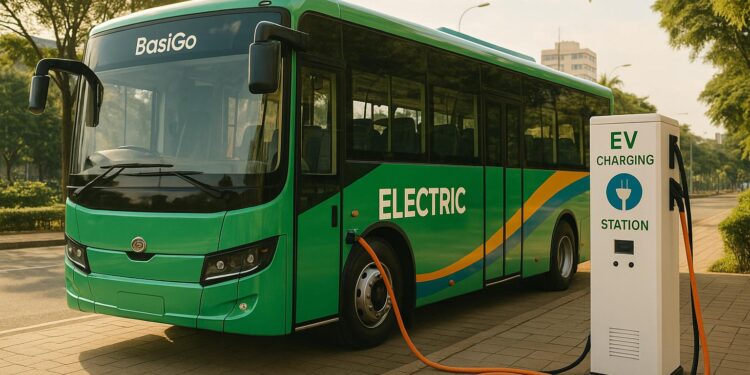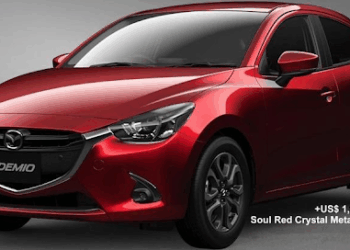Nairobi is set for a cleaner commute. Kenyan electric mobility company BasiGo is building 16 EV bus charging stations across the city to support zero-emission buses. These stations will use DC fast chargers, smart tech for scheduling and maintenance, and Kenya’s renewable energy grid for power.
Key Points:
- 16 new charging stations will join the 3 already operating in Nairobi.
- Locations are aligned with major bus routes and transit hubs like Embakasi.
- Charging costs: Kshs 17/kWh (peak) and Kshs 8/kWh (off-peak) under a special tariff.
- BasiGo’s Pay-As-You-Drive model offers free charging for operators.
- Kenya’s grid, powered by 90% renewable energy, ensures clean energy use.
- EV buses reduce air pollution and cut transit emissions by replacing diesel-powered vehicles.
This initiative not only addresses Nairobi’s air quality concerns but also reduces fuel costs for operators and aligns with Kenya’s green energy goals. BasiGo’s expansion could set the stage for broader EV adoption in Kenya and beyond.
Why Electric Buses Are Taking Over The Streets of Nairobi (BasiGo + Embasava Sacco)

The 16 EV Bus Charging Stations Explained
BasiGo currently runs three charging stations in Nairobi and is set to expand this network to 16 stations. These locations have been carefully chosen to align with major bus routes and areas of high demand, making operations smoother for bus operators. Here’s a closer look at where these stations will be situated.
Where the Charging Stations Will Be Located
The charging stations will be positioned at key transit hubs and along major bus routes to ensure easy access. Take Embakasi, for example – it’s a critical hub because it hosts Embassava Sacco, an operator already making the shift to electric buses. Placing stations in such strategic areas simplifies the transition to electric mobility for operators. With these prime locations identified, the project is now entering its development phase.
Construction Timeline and Key Dates
While exact timelines for construction haven’t been revealed, this expansion marks a significant step toward building a robust electric bus infrastructure. The success of this network is expected to serve as a blueprint for deploying similar charging networks across Kenya.
How the Charging Network Works
BasiGo’s charging network combines advanced DC fast charging, renewable energy, and smart services to keep electric buses on the move. Designed with bus operators in mind, the system ensures quick, reliable charging and seamless integration into daily operations.
DC Fast Charging Capabilities
BasiGo’s charging stations use DC fast charging technology to recharge electric buses quickly, whether during scheduled breaks or overnight. This minimizes downtime and keeps bus routes running smoothly.
Each station is directly connected to Kenya Power, ensuring a steady energy supply and reducing the risk of power disruptions that could interfere with operations.
Power Sources and Charging Costs
The charging network is powered by Kenya’s national grid, which is rich in renewable energy. In fact, 90% of the energy generated and consumed in Kenya in 2021 came from renewable sources like hydro, geothermal, solar, and wind power. This means BasiGo’s electric buses operate on clean, sustainable energy.
"Powered by Kenya’s 90% renewable energy, BasiGo’s charging network is ready to make Kenya a world leader in sustainable transport!" – BasiGo
Charging costs are another highlight. On April 1, 2023, the Energy and Petroleum Regulatory Authority (EPRA) approved a special e-mobility tariff. Under this tariff, operators pay Kshs 17 per kWh for energy consumption up to 15,000 kWh during peak hours and Kshs 8 per kWh during off-peak hours. Additionally, operators using BasiGo’s Pay-As-You-Drive model enjoy free charging, making the switch to electric buses even more affordable. These cost-efficient solutions, paired with renewable energy, ensure that BasiGo’s network is both economical and environmentally friendly.
Smart Technology and Safety Features
The charging network goes beyond just powering buses – it also serves as a hub for maintenance and safety. While buses charge overnight, expert staff conduct inspections and perform routine maintenance, ensuring vehicles are always in top condition.
BasiGo backs this system with a promise of 90% uptime for buses every month. Their service package includes free scheduled maintenance, nightly inspections, free roadside assistance, and comprehensive vehicle insurance. This level of support helps operators focus on running their routes without worrying about unexpected issues.
Strategically located along key bus routes, the charging stations make it easy for drivers to recharge during shifts, reducing range anxiety and simplifying operations. By combining reliable power, affordable charging, and integrated maintenance, BasiGo’s network is paving the way for Kenya’s transition to sustainable public transportation.
sbb-itb-e5ed0ed
How This Changes Nairobi’s Transportation and Climate Goals
BasiGo’s 16 charging stations are set to reshape Nairobi’s transportation landscape by cutting down on diesel reliance and introducing accessible, reliable EV charging. This shift doesn’t just promise smoother commutes – it also brings environmental benefits, marking a significant step in Nairobi’s transit transformation.
Encouraging More Operators to Adopt EV Buses
With charging stations strategically placed along key routes, bus operators can seamlessly incorporate charging into their daily schedules. This convenience makes it easier for operators – big and small – to transition to EV buses, helping expand adoption across the city.
Cleaner Air and Lower Emissions
Switching from diesel to electric buses means fewer emissions, leading to cleaner air around transit hubs. This change isn’t just good for the environment – it’s a win for commuters and nearby communities. Over their lifespan, electric buses leave a smaller carbon footprint, improving the overall quality of life for those in bustling transit areas.
Economic Opportunities and Savings
The benefits go beyond the environment. The charging network will create jobs in construction, technical services, and maintenance, injecting new life into the local economy. For passengers, it means more reliable service and smoother rides. Plus, the increased activity around these hubs could provide a boost to nearby businesses, bringing economic growth to the surrounding areas.
Fixing Infrastructure Problems and Future Growth
BasiGo’s charging stations tackle a major hurdle in Kenya’s transition to electric bus systems. For years, the lack of infrastructure has kept EV buses off Nairobi’s streets, but now, practical solutions are beginning to reshape the city’s transportation framework.
Solving Current Infrastructure Problems
As of September 2025, Kenya’s EV network supported 9,047 registered EVs – a notable increase from just 2,694 in 2023. Yet, this growth highlights the challenges of scaling EV adoption in the country. The situation reflects what experts often describe as the “chicken and egg” dilemma in EV adoption.
"People are hesitant to buy electric vehicles (EVs) without readily accessible charging infrastructure, yet investment often lags until there is sufficient demand for Electric Vehicles", explains Dorcus Wanjiru Kamotho.
BasiGo is addressing this issue head-on with its 16 strategically located charging stations. These stations are positioned along essential routes, making EV charging as convenient as stopping for fuel at a gas station. By eliminating this operational barrier, BasiGo is paving the way for smoother adoption of electric buses.
These efforts in Nairobi are just the beginning of BasiGo’s larger vision to expand its EV infrastructure.
Expansion Plans Beyond Nairobi
After establishing a foothold in Nairobi, BasiGo is extending its reach across Kenya and into the broader region. In July 2025, it launched Kenya’s first pilot program for electric matatus, in partnership with 4NTE SACCO and Manchester Travellers Coach SACCO. These iconic 16- to 19-seater minibuses are a cornerstone of Kenya’s intercity transport system.
The 4NTE SACCO is testing BasiGo’s electric matatus on the Nyahururu–Nyeri and Nyahururu–Nakuru routes, while Manchester operates on the Thika–Nairobi corridor. To support these operations, DC fast chargers have been installed in Nyahururu and Thika, ensuring reliable charging for intercity travel.
"We are delighted to extend electric mobility beyond Nairobi and electrify an iconic part of Kenya’s history – the matatu", says Moses Nderitu, Managing Director, Kenya at BasiGo. "By partnering with visionary SACCOs like 4NTE and Manchester, we’re showing that electric mobility is not only possible but practical for intercity and intercounty transit."
Looking ahead, BasiGo plans to deploy more than 1,000 electric vans across Kenya in the coming years. The company has also entered the Rwandan market, where it imports and sells fully built electric buses. These initiatives aim to scale BasiGo’s EV model across Africa, creating a network of electric public transportation systems.
Government Support and Policy Needs
For BasiGo to sustain its growth and expand regionally, strong government backing is essential. High import taxes on fully built EVs and the higher upfront costs compared to diesel buses remain significant hurdles. Addressing these issues through policy reforms will be key to accelerating the shift to electric public transit.
Kenya Power’s collaboration with BasiGo highlights the potential of public-private partnerships in advancing infrastructure development. Initiatives like the rollout of charging stations along key routes demonstrate what’s possible when both sectors work together. However, more comprehensive policy measures are needed, including streamlined regulations for installing charging stations, increased investment in renewable energy, and incentives to make electric buses more affordable compared to diesel options.
The leap in EV registrations, from 2,694 in 2023 to over 9,000 in 2025, signals Kenya’s potential to lead the way in electric mobility across the region. With the right mix of infrastructure, policy support, and private sector innovation, the country could become a model for sustainable transportation in Africa.
Conclusion: Moving Nairobi’s EV Future Forward
BasiGo’s 16 charging stations are playing a key role in reshaping Nairobi’s public transit system while tackling air pollution caused by traditional matatus, which contribute roughly 20% of the city’s transport emissions.
With Kenya aiming for 5% of all vehicles to be electric by 2025, BasiGo’s charging network is a critical piece in making electric public transport a feasible option. This infrastructure marks an important step toward cleaner, more efficient urban mobility in Nairobi.
Kenya’s electricity grid, powered by 90% renewable energy, ensures that BasiGo’s electric buses deliver maximum environmental benefits. This aligns with the country’s broader goal of cutting greenhouse gas emissions by 32% by 2030.
The road ahead relies heavily on collaboration and supportive policies. These efforts could position Kenya as a hub for EV manufacturing, sparking job creation and contributing to economic growth.
FAQs
What impact will BasiGo’s new charging stations have on electric bus adoption in Nairobi?
BasiGo is gearing up to establish 16 electric vehicle (EV) bus charging stations across Nairobi – a move that could make electric buses a more practical choice for operators. By tackling the challenge of limited charging infrastructure, these stations aim to smooth the transition for bus operators shifting from diesel to electric fleets.
This effort is poised to encourage the use of electric buses, cut down on fossil fuel dependence, and help improve Nairobi’s air quality. It also supports the city’s broader push toward a cleaner, more sustainable public transportation network.
What are the economic and environmental advantages of replacing diesel buses with electric buses in Nairobi?
Switching to electric buses in Nairobi brings big savings and positive environmental impacts. Operators could slash operational costs by up to 70%, thanks to much lower fuel and maintenance expenses. Over time, this makes electric buses a smarter financial choice.
On the environmental side, these buses play a key role in reducing air pollution and greenhouse gas emissions. This aligns with Kenya’s goals to address climate change. By adopting cleaner public transport, Nairobi is moving toward better air quality and more sustainable mobility for its people.
What is BasiGo’s Pay-As-You-Drive model, and how does it benefit bus operators?
BasiGo’s Pay-As-You-Drive (PAYD) model is changing the game for bus operators by offering electric buses without the hefty upfront price tag. Instead of purchasing the bus outright, operators pay based on the miles they drive. And here’s the best part – this payment covers everything: charging, maintenance, roadside assistance, and insurance.
This setup makes electric buses far more affordable and within reach for operators who might otherwise face financial hurdles. On top of that, operators can tap into BasiGo’s well-placed charging stations, ensuring their operations run smoothly while also supporting a cleaner, greener transportation network in Nairobi.
Related Blog Posts
- Guide to Electric Vehicle Charging Stations in Kenya
- EV Charging Stations in Nairobi: Where and How to Recharge
- Kenya opens East Africa’s first EV battery lab in Nairobi
- ABSA deploys Kenya’s fastest EV supercharger




